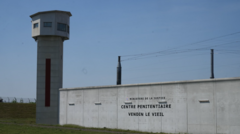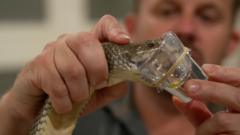The return of five members of the 'Bali Nine' drug ring, who served extensive sentences in Indonesia, highlights ongoing debates about international drug policies, humanitarian grounds for repatriation, and the implications for Australia-Indonesia relations.
Australia Welcomes Home Remaining 'Bali Nine' Drug Smugglers After Two Decades in Indonesian Prisons

Australia Welcomes Home Remaining 'Bali Nine' Drug Smugglers After Two Decades in Indonesian Prisons
Five members of the notorious 'Bali Nine' drug smuggling ring have returned to Australia after nearly 20 years in prison, a move that stirs mixed sentiments regarding drug laws and international relations.
The remaining members of the infamous "Bali Nine" drug trafficking group have returned to Australia after nearly two decades of incarceration in Indonesia. Prime Minister Anthony Albanese confirmed on Sunday that the five men—Matthew Norman, Scott Rush, Martin Stephens, Si Yi Chen, and Michael Czugaj—have been repatriated following their release from the Indonesian prison system. Albanese expressed gratitude towards Indonesian President Prabowo Subianto for his compassion in facilitating their return.
The case of the 'Bali Nine' gained global notoriety beginning in 2005 when nine Australians were apprehended for attempting to smuggle a significant amount of heroin (8.3 kg) out of Bali. This case put the spotlight on Indonesia’s rigid drug laws, which are regarded as some of the toughest worldwide. Two of the group's leaders, Andrew Chan and Myuran Sukumaran, were executed in 2015, igniting a diplomatic crisis between Australia and Indonesia, as Australia briefly recalled its ambassador following the executions.
Among the original group, five have now completed their sentences, with one member, Renae Lawrence, having already been released in 2018 after her sentence was commuted. Another member, Tan Duc Thanh Nguyen, unfortunately, passed away from cancer while incarcerated in 2018, marking a stark reminder of the consequential heroin trade.
Following their release, the men traveled by Jetstar from Bali to Darwin, Australia, without media presence. Indonesian law minister Yusril Ihza Mahendra stated that while the repatriated individuals were treated as "prisoners" during the transfer, they are now under Australian jurisdiction. Notably, no pardons were issued by the Indonesian president, highlighting that the decision for repatriation stemmed from humanitarian considerations.
The Australian government emphasized the need for the men to focus on rehabilitation and reintegration into society after their lengthy imprisonment. Albanese acknowledged the severity of their crimes but indicated that after nearly 19 years, it was time for them to return home. This decision draws comparisons to other recent negotiations by the Australian government for the release of detained individuals abroad, including the high-profile cases of Julian Assange and Cheng Lei.
As they reintegrate into Australian society, the societal response is yet to be fully gauged, with ongoing discussions anticipated regarding drug smuggling laws and bilateral relations with Indonesia.
The case of the 'Bali Nine' gained global notoriety beginning in 2005 when nine Australians were apprehended for attempting to smuggle a significant amount of heroin (8.3 kg) out of Bali. This case put the spotlight on Indonesia’s rigid drug laws, which are regarded as some of the toughest worldwide. Two of the group's leaders, Andrew Chan and Myuran Sukumaran, were executed in 2015, igniting a diplomatic crisis between Australia and Indonesia, as Australia briefly recalled its ambassador following the executions.
Among the original group, five have now completed their sentences, with one member, Renae Lawrence, having already been released in 2018 after her sentence was commuted. Another member, Tan Duc Thanh Nguyen, unfortunately, passed away from cancer while incarcerated in 2018, marking a stark reminder of the consequential heroin trade.
Following their release, the men traveled by Jetstar from Bali to Darwin, Australia, without media presence. Indonesian law minister Yusril Ihza Mahendra stated that while the repatriated individuals were treated as "prisoners" during the transfer, they are now under Australian jurisdiction. Notably, no pardons were issued by the Indonesian president, highlighting that the decision for repatriation stemmed from humanitarian considerations.
The Australian government emphasized the need for the men to focus on rehabilitation and reintegration into society after their lengthy imprisonment. Albanese acknowledged the severity of their crimes but indicated that after nearly 19 years, it was time for them to return home. This decision draws comparisons to other recent negotiations by the Australian government for the release of detained individuals abroad, including the high-profile cases of Julian Assange and Cheng Lei.
As they reintegrate into Australian society, the societal response is yet to be fully gauged, with ongoing discussions anticipated regarding drug smuggling laws and bilateral relations with Indonesia.



















